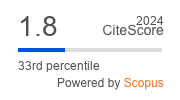Determination of Customer Satisfaction of Tax Service Office Services Using C4.5 and PSO
Penentuan Kepuasan Pelanggan terhadap Pelayanan Kantor Pelayanan Pajak Menggunakan C4.5 dan PSO
Abstract
Tax Service Office is a work unit of the Directorate General of Taxation that carries out services in the field of taxation to the public, both registered and unregistered taxpayers, within the working area of the Directorate General of Taxes. The number of Primary Tax Service Offices in Indonesia, one of which is the Primary Tax Service Office in Bekasi, has various ways to increase the satisfaction of taxpayers for the services provided. This study aims to determine the accuracy of taxpayers' satisfaction using data mining techniques using the Decision Tree C4.5 Algorithm with Particle Swarm Optimization (PSO) feature selection, validation uses cross validation techniques while accuracy is measured by the confussion matrix, which is to determine the level of service satisfaction conducted by distributing questionnaires to taxpayers in the Primary Tax Service Office in Bekasi as many as 500 questionnaires. The results show the accuracy value of Taxpayers' service satisfaction at the Pratama Tax Service Office using the Decision Tree C4.5 Algorithm with a feature selection of Particle Swarm Optimization (PSO) of 98,85%, Precission of 98,85% and Recall of 100%.
Downloads
References
C. Muchlis, "Kontan," Survey: Kepuasan terhadap Layanan Pajak Meningkat di Tahun lalu, p. 1, Senin, 28 Januari 2019.
V. Zeithaml, M. Bitner and D. Gremier, Services marketing: Integrating Customer Focus Across The Firm, Singapore: McGraw-Hill, 2006.
D. Kamagi and S. Hansun, "Implementasi Data Mining dengan Algoritma C4.5 untuk Memprediksi Tingkat Kelulusan Mahasiswa," J. Ultim., vol. 6, no. 1, pp. 15-20, 2014.
I. Romli, E. Pusnawati and M. Jaenal, "Comparison of NB and NB-PSO to determine Level of Vehicles Sales," in ICoSHEET 2019, Semarang, 2019.
M. Jaenal, A. Nugroho and I. Romli, "Analysis of Effectiveness Particle Swarm Optimization In Improving The Preformance of Naive Bayes Algorithm," in ICID, Yogyakarta, 2018.
A. Rifai and R. Aulianita, "Komparasi Algoritma Klasifikasi C4.5 dan Naive Bayes Berbasis Particle Swarm Optimization untuk Penentuan Resiko Kredit," Journal Speed - Sentra Penelitian Engineering dan Edukasi, vol. 10, no. 2, pp. 49-55, 2018.
Oktafianto, "Analisis Kepuasan Mahasiswa Terhadap Pelayanan Akademik Menggunakan Metode Algoritma C4.5," Jurnal Teknologi Informasi Magister Darmajaya, vol. 2, no. 1, pp. 1-11, 2016.
L. Ramdhani, "Penerapan Particle Swarm Optimization (PSO) Untuk Seleksi Atribut Dalam Meningkatkan Akurasi Prediksi Diagnosis Penyakit Hepatitis Dengan Metode Algoritma C4.5," Swabumi, vol. 4, no. 1, pp. 1-15, 2016.
H. Noor, "Optimasi Model Klasifikasi C4.5 Dan Particle Swarm Optimization Untuk Prediksi Siswa Bermasalah," Technologia: Jurnal Ilmiah, vol. 9, no. 4, pp. 228-237, 2018.
A. Febriarini and E. Astuti, "Penerapan Algoritma C4.5 untuk Prediksi Kepuasan Penumpang Bus Rapid Transit (BRT) Trans Semarang," Jurnal Eksplora Informatika, vol. 8, no. 2, pp. 95-103, 2019.
M. Syarif, "Penerapan Particle Swarm Optimazation Untuk Menentukan Kredit Kepemilikan Rumah Dengan Menggunakan Algoritma C4.5," Jurnal Techno Nusa Mandiri, vol. 12, no. 2, pp. 147-156, 2015.
S. Mujab, "Pencarian Model Terbaik antara Algoritma C4.5 dan C4.5 Berbasis Particle Swarm Optimization Untuk Prediksi Promosi Deposito," Universitas Dian Nuswantoro, Semarang, 2013.
A. Yuliana and D. Pratomo, "Memprediksi Kepuasan Mahasiswa Terhadap Kinerja Dosen Politeknik TEDC Bandung," in Semnasinotek, Kediri, 2017.
R. Feldman, "Techniques and Applications for Sentiment Analysis," ACM, vol. 56, no. 4, p. 82, 2013.
S. Nuryati, "Pengujian Akurasi Data Potensi Kepuasan Pelanggan Kereta Commuterline (KRL) dengan Algoritma C4.5," Universitas Pelita Bangsa, Bekasi, 2018.
Copyright (c) 2020 Jurnal RESTI (Rekayasa Sistem dan Teknologi Informasi)

This work is licensed under a Creative Commons Attribution 4.0 International License.
Copyright in each article belongs to the author
- The author acknowledges that the RESTI Journal (System Engineering and Information Technology) is the first publisher to publish with a license Creative Commons Attribution 4.0 International License.
- Authors can enter writing separately, arrange the non-exclusive distribution of manuscripts that have been published in this journal into other versions (eg sent to the author's institutional repository, publication in a book, etc.), by acknowledging that the manuscript has been published for the first time in the RESTI (Rekayasa Sistem dan Teknologi Informasi) journal ;








